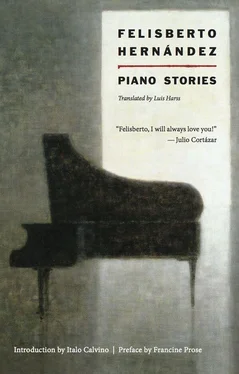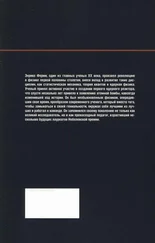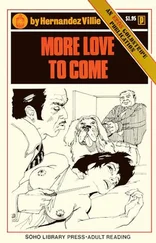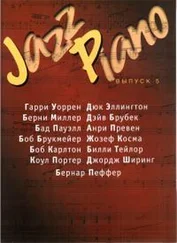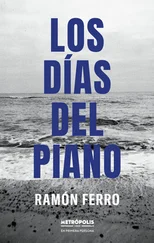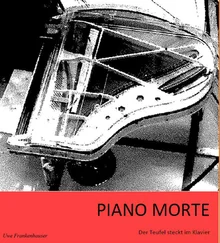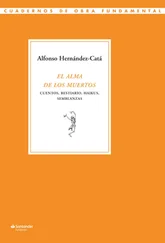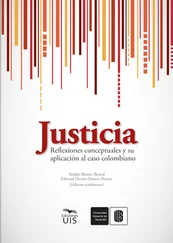Felisberto Hernandez - Piano Stories
Здесь есть возможность читать онлайн «Felisberto Hernandez - Piano Stories» весь текст электронной книги совершенно бесплатно (целиком полную версию без сокращений). В некоторых случаях можно слушать аудио, скачать через торрент в формате fb2 и присутствует краткое содержание. Год выпуска: 2014, Издательство: New Directions, Жанр: Современная проза, на английском языке. Описание произведения, (предисловие) а так же отзывы посетителей доступны на портале библиотеки ЛибКат.
- Название:Piano Stories
- Автор:
- Издательство:New Directions
- Жанр:
- Год:2014
- ISBN:нет данных
- Рейтинг книги:4 / 5. Голосов: 1
-
Избранное:Добавить в избранное
- Отзывы:
-
Ваша оценка:
- 80
- 1
- 2
- 3
- 4
- 5
Piano Stories: краткое содержание, описание и аннотация
Предлагаем к чтению аннотацию, описание, краткое содержание или предисловие (зависит от того, что написал сам автор книги «Piano Stories»). Если вы не нашли необходимую информацию о книге — напишите в комментариях, мы постараемся отыскать её.
Piano Stories
Piano Stories — читать онлайн бесплатно полную книгу (весь текст) целиком
Ниже представлен текст книги, разбитый по страницам. Система сохранения места последней прочитанной страницы, позволяет с удобством читать онлайн бесплатно книгу «Piano Stories», без необходимости каждый раз заново искать на чём Вы остановились. Поставьте закладку, и сможете в любой момент перейти на страницу, на которой закончили чтение.
Интервал:
Закладка:
The things I have to imagine are very lazy and slow in composing themselves to come. It’s like when I’m waiting for sleep, and I soon grow accustomed to certain sounds and can go on imagining or fall asleep as if they weren’t there. But the sounds and small happenings with which those three women filled the room keep me tossing my head right and left.
When Celina performed for us that time I took in everything that reached my eyes and ears. Before that, I had been letting things become too familiar, until they had almost stopped surprising me and I no longer really appreciated what she did.
My mother and grandmother seemed to be halfway into a sigh from which they hung suspended, as if afraid that at the supreme moment, just when their effort to understand was supposed to take off, their wings would carry them about as far as useless hens’ wings.
I was probably very bored, after a while.
Here I’ve stopped again. I’m very tired. I’ve had to keep watch all around myself to make sure that he — my partner — doesn’t sneak in with my memories. As I said before, I want to be myself alone. But, to keep him out, I’m forced to think of him constantly. With a part of myself I’ve made a sentry who stands guard over my memories and thoughts, but that means I also have to watch the sentry so he won’t start listening to the story of the memories and get so caught up in it that he falls asleep. On top of everything, I’ve got to lend him my eyes — the ones I have now.
My eyes, now, are cruel, insistent: they demand a great effort from the eyes of the child, who must be old and tired by now. Besides, he has to see everything in reverse: he is not allowed to remember the past but obliged to perform the miracle of remembering toward the future. But how is it that, while still being myself, I suddenly see everything differently? Can my partner have put on my eyes? Can we be sharing the same pair of eyes? Can the sentry watching the street through the windows of my room have fallen asleep and my partner have stolen my eyes from him? Isn’t seeing through my windows enough for him that he now also wants to see through my eyes? He would not hesitate to pry open a dead man’s eyes to find out what’s inside them. He is after those child’s eyes, determined to pinpoint their mechanism as if the pieces of memory could be taken apart like a clock. The child stops in fright; his eyes blink on and off. He doesn’t know yet — and it may already be too late for him ever to realize — that his images are random and incomplete: he has no notion of time and must have fused many hours and nights into one. He has confused the movements of different people, attributed the feelings of one to another and stumbled on charming discoveries. The eyes I now have know these things, but there are many other things they don’t know. They don’t know that the images feed on movement and live only in the sleeping self. My partner stops the images and the sleeping self wakes up; he nails them down with his eyes as if he were pinning butterflies in an album. Even when the child’s images seem motionless, they feed on movement: someone makes them throb and pulse in the eye. And it is that someone whom the eyes I now have are betraying. When the child’s eyes seize a part of something, they think it is the whole thing. (And the child cares no more than a dream does whether his images are complete or similar to those of real life: he simply proceeds as if they were.) When the child looked at Celina’s bare arm he felt the whole of her was in that arm. The eyes I now have want to capture Celina’s mouth, but they can’t define the shape of her lips in relation to the rest of her face; they want to grasp a single feature and are left with none. The parts have lost their mysterious relationship to each other, they have lost their balance and natural proportion and seem disconnected, as if a clumsy hand had drawn them. If the hand tries to get the lips to articulate a word, their movements are as forced as those of a wind-up doll.
Only for a moment do the eyes I now have see well: the fleeting instant when they meet the eyes of the child. Then the eyes I now have reach avidly for the images, thinking they are still in time to linger on them. But an invisible innocence in the air of the world shelters the child’s eyes. Nevertheless, the eyes I now have persist until they are tired. Even on the edge of sleep my partner tries to remember Celina’s face, and when he stirs the waters of memory the images under the surface are deformed, as if seen in a cheap mirror with waves in the glass.
I realize the memory is over only when I feel an immediate physical discomfort in my eyes: a stinging as of tears drying on my eyelids.
A few days ago, in the evening, a strange and unprecedented event took place in me. Before, I could always find a precedent for an event, however strange: somewhere in my soul lay buried the first germ of it, at some point in my life there had been the hint of a scene or a plot that was a rehearsal for this final performance. But a few days ago, in the evening, the performance came unannounced. I don’t know if the players were in the wrong theater, and whether it was by mistake or because they had deliberately broken in. If one were to call my condition that evening a sickness, I would say I didn’t know I was predisposed to it, and if the sickness was a punishment, I would say it had fallen on the wrong person. It was not that I felt my partner take over: for hours I myself, all of me, was another person — such was the condition my sickness imposed on me. I was in the situation of someone who has assumed, all his life, that madness was one way, and, suddenly in its grip, discovers that it is not only different from the way he’d imagined it but that the person suffering from it is someone else, or has become someone else, and that this someone else is not interested in finding out what madness is like: he is simply immersed in it, or it has descended on him, and that’s that.
While I hadn’t quite ceased being who I was in order to become who I was meant to be, I was put through some very peculiar agonies. The person I had been and the man I was becoming would always have something in common: their memories. But as the memories were transferred to the man I was becoming, even while they remained within the same visual range and seemed factually unchanged, they were taking on a new soul. On this new man’s face there was the hint of a moneylender’s smile as the memories were appraised before being pawned. The moneylender’s hands weighed the memories, not for their personal value, loaded with private feelings and associations, but for their intrinsic worth.
Then came another stage: the smile turned bitter because the pawned memories no longer weighed in the moneylender’s hand: they were made of sand, suggesting age, that was all — the memories and times stolen by the moneylender were worthless. But there followed an even worse stage: when the moneylender had smiled his bitter smile over his useless theft he still had a soul, but now he reached total indifference. His smile faded and he finally became what he was destined to be: an empty railway car, detached from life.
At first, that evening, when I started remembering and being someone else, I saw my past life as if it were in the next room. I had once been in that room, I had lived there; more than that: it had been my room. And now I saw it from another room, the room where I lived now, without quite knowing what distance separated the two rooms in time and space. In that room next door I saw my poor lost self in the days when he was innocent. And I saw him not only seated at the piano in the lamplight with Celina, his mother and grandmother looking on, never suspecting his unrequited love, but with other loves as well. From all times and places I saw persons, furniture, feelings gather for the ceremony organized by the “inhabitants” of Celina’s parlor. For a moment they were all jumbled and confused, as if bits of old movies were being mixed together, but then those that belonged in the same room recognized each other and began to form a separate group for each room: they seemed to have an unerring instinct for picking each other out, even if on reflection they proved to have been wrong. (Some nevertheless refused to regroup, but had to in the end, while others stonewalled and managed to stay together even if they were in the wrong place, and still others vanished as lightly as papers blown off a table by the wind. Some of those that blew off flitted around uncertainly, drawing our eyes after them, until they settled in some other familiar spot.) With these exceptions, I can say that all the places, times, and memories attending the ceremony, no matter what subtle threads or sympathies united them, were totally oblivious to others not of their same lineage. When a particular lineage was rehearsing its memories, it remained for some time in a spot next to the one from which I was observing it. Suddenly the performance would stop and the players would repeat a scene or go back to one that had happened long before. But the stops and abrupt changes of scene were muted, as if the missteps occurred in silk slippers. The players were never ashamed of having made a mistake and could repeat the same smile a thousand times before it wore out or looked strained. In the search for some scene’s lost detail there was always a longing that brought everything back to life. When an extraneous detail introduced its own lineage, the previous lineage vanished, and if it reappeared in a while it showed no resentment toward the intruder.
Читать дальшеИнтервал:
Закладка:
Похожие книги на «Piano Stories»
Представляем Вашему вниманию похожие книги на «Piano Stories» списком для выбора. Мы отобрали схожую по названию и смыслу литературу в надежде предоставить читателям больше вариантов отыскать новые, интересные, ещё непрочитанные произведения.
Обсуждение, отзывы о книге «Piano Stories» и просто собственные мнения читателей. Оставьте ваши комментарии, напишите, что Вы думаете о произведении, его смысле или главных героях. Укажите что конкретно понравилось, а что нет, и почему Вы так считаете.
